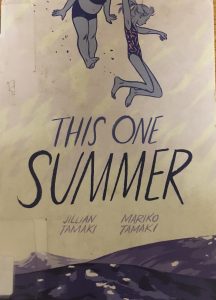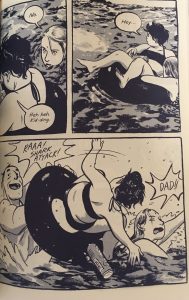Title: This One Summer
Author(s): Mariko Tamaki
Illustrator/Photographer: Jillian Tamaki
Publisher and Year: First Second Books, 2014
Number of Pages: 319
Tags: Emotion, Family, Fiction, Friendship, Graphic Novel, 6-8, 8-12, Sarah Luce
Genre: Fictional Graphic Novel
Descriptive Annotation:
This graphic novel is about a young teenage girl and her family who go up to their cottage on a lake every summer. The story follows the girl, Rose, and her friend, Windy, as they spend their days at the beach and their nights watching horror movies from the local store. The girls are exposed to many adult things as they hang around the store where the older kids hang out. Rose’s family is also going through a rough patch that summer and Rose learns of the secret behind her mother’s new negative attitude towards the lake. This book has a lot of crude language and mature themes that are not acceptable for students younger than high school age, if not older.
Classroom Application:
This book could be used to discuss life issues in a high school setting. Some students who read this book might be introduced to topics they have had little experience with, if any at all. It is important to use this book as a discussion starter, instead of simply a “free reading” book, as it could stir up strong feelings within students.
Linguistic and Cultural Diversity Analysis:
This One Summer represents the teenage culture around the “coming of age” period in adolescents’ lives. It was published in 2014, so the portrayal is similar to today’s experience. The story is a graphic novel, so most of the dialogue is through speech bubbles and a lot of the plot is carried through the illustrations. In one scene, the young girls are talking about the older kids they ran into at the store, and it is clear they are impacted by the teenagers’ actions. Rose and Windy start talking about them once they get home saying, “‘Oh my god those girls are sooo loud. I bet you they were drunk. They’re like, DRUNKS’” (page 40). I would introduce this story to my class with a warning of the maturity of its content and language. The story not only deals with intense topics, but also situations where families are apart, like when Rose’s mom says to Rose, “‘I know you’re angry. Rose. I didn’t send your dad away’” (page 224). It gives students an insight into what life is like for families that may be different than their own.
Illustration:


